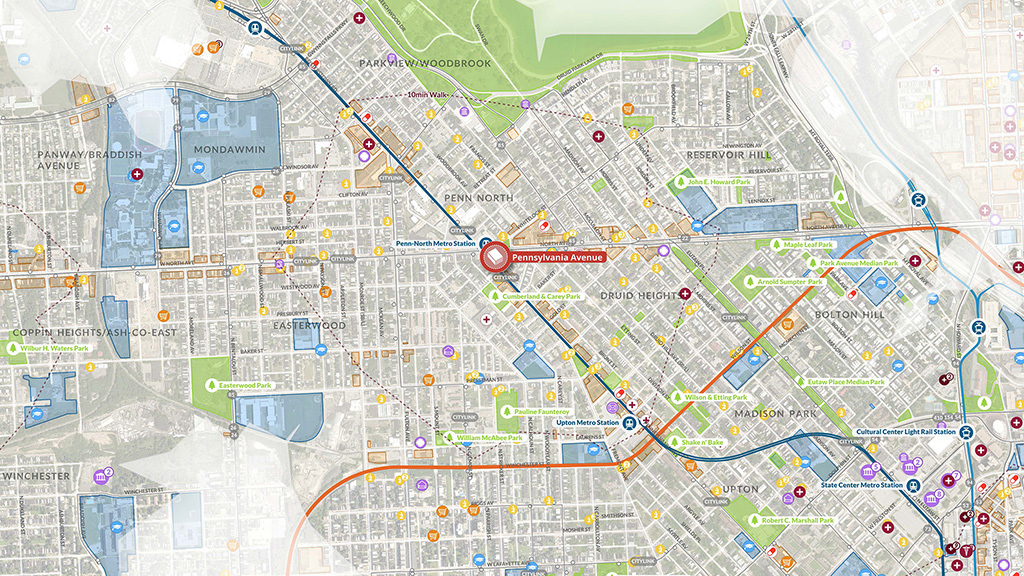A New Tool Helps Organizations Maximize Their Community Impact
August 13, 2024 | By Al-Jalil Gault and Elaine Asal
The Enoch Pratt Free Library System in Baltimore is like many other vital civic infrastructure organizations around the U.S. and the world: serving too much need with too little resources. Civic infrastructure like EPFL forms the backbone of our communities. Libraries, schools, hospitals, local government entities, and non-profit organizations have come to provide far more than their essential services; they’ve become invaluable public spaces for gathering, connecting, socializing, and learning.
Where civic institutions are located and how they are designed plays a crucial role in how well they can support and enhance our communities’ quality of life. And in times of social and economic disparity, their importance is magnified. Strategically locating these institutions in neighborhoods that need them most bridges gaps in access to resources and services, fostering a more inclusive and equitable society.
Gensler and EPFL worked together on a master plan to address resource allocation with the Urgency Index, a Gensler-created tool that helps public infrastructure organizations prioritize their investments for impact.
Gensler’s data-driven Urgency Index identifies the most suitable locations for strategic infrastructure expansion. It combines research and Geographic Information System (GIS) data to inform decisions by mapping and layering data. The Index helps institutions make informed decisions that maximize their impact by locating in the communities that need them most.
We developed the Urgency Index for projects with museum, library, community center, and housing association clients seeking to prioritize their missions while expanding their reach. Many of these clients are starting to use this tool for not just libraries and museums, but also for housing strategies, healthcare service models, and public education.
The Urgency Index in Action for Baltimore
A primary outcome of the Urgency Index is pinpointing which communities need which services most.
In Baltimore, Gensler, along with Margaret Sullivan Studio and the Baltimore Neighborhood Indicators Alliance, partnered with Enoch Pratt Free Library system (EPFL) on a master plan for library facilities and service priorities for the next decade, using the Urgency Index to establish and evaluate key need factors.
We determined the library urgency percentage for neighborhoods based on the number of community centers, recreation centers, and job centers; the percentage of households with internet access; changes in library eCard registrations; high school completion rates; unemployment rates; and population density.
By combining these metrics, the Index generates a score for the urgency of establishing or enhancing library services in a specific area. The higher the score, the greater the chance that a neighborhood would receive substantial benefit for new library investments.
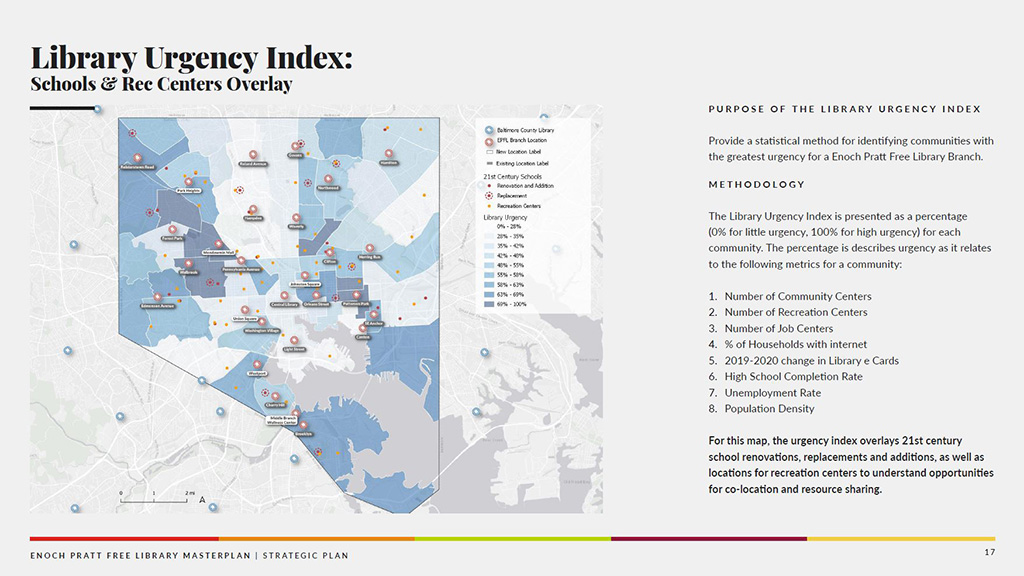
This strategic planning transforms libraries into vital community hubs that support education, provide access to technology, and offer spaces for social interaction and learning. By relying on data-driven insights, EPFL can better serve the community, promote social equity, and enhance the overall quality of life for Baltimore residents.
Centering on Intelligence, Equity, and Accessibility
In today’s complex world, designing equitable and accessible communities requires more than intuition. Our data-driven approach creates intelligence that allows deeper consideration of nuanced needs so we can identify workable solutions.
Intelligence
Our world is inundated with data, and the Urgency Index harnesses this information to measure the performance of neighborhoods. Depending on the client’s mission and vision, the tool can analyze data across various categories such as people, health and well-being, community and culture, wealth and economic development, learning and education, transportation and mobility, and media, entertainment, and recreation.
This intelligent use of data enables us to tailor our recommendations to the specific needs of each community, ensuring that interventions are both impactful and sustainable.
Equity
Poor life outcomes in health, education, and wealth disproportionately impact minority and low-income populations. The disparity is often geographically pronounced; up to 60% of an individual’s health status can be predicted based on their zip code.
The Urgency Index is fundamentally based on a belief in equity — that everyone should receive the unique resources they need to experience a high quality of life. By identifying communities facing the greatest risks, the Urgency Index pinpoints locations with the most significant needs.
Accessibility
Accessibility reflects the ability of individuals to take advantage of the benefits offered by civic institutions. At Gensler, we utilize the concept of the 20-minute city as the foundation for accessibility, where everyone can meet fundamental daily needs within a 20-minute walk from home, including food, health and wellness, employment, and education. The Urgency Index customizes need to location so that future placement of civic institutions creates maximum accessibility.
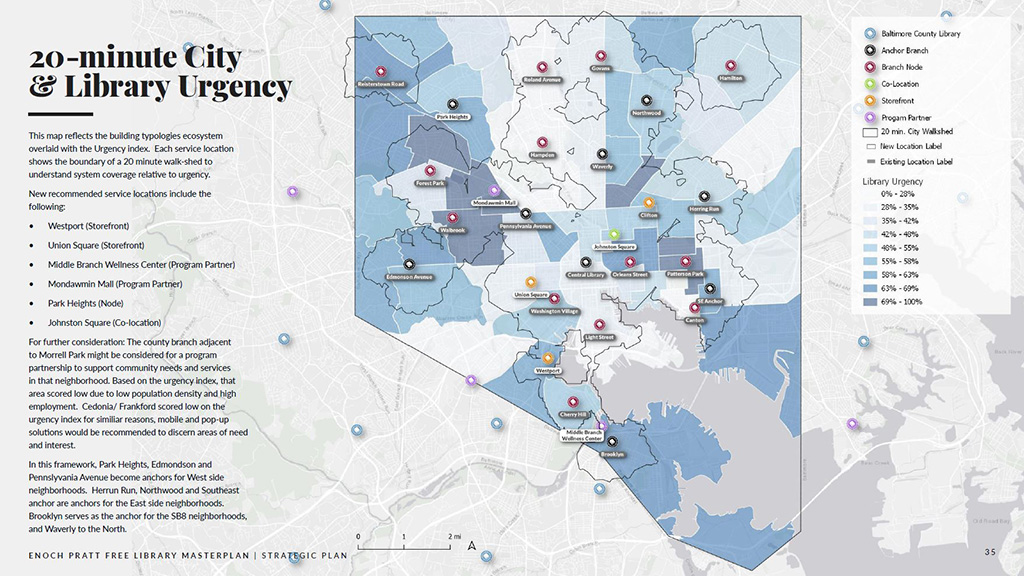
Expanding Play-Based Learning in Raleigh
Post-pandemic, the demand for play-based learning opportunities skyrocketed, leading to severe overcrowding at the Marbles Kids Museum in downtown Raleigh, N.C. The museum often had to turn visitors away after reaching maximum capacity.
Marbles partnered with Gensler to explore expansion opportunities throughout Wake County, aiming to meet demand through improved accessibility. We evaluated potential neighborhoods for the museum’s expansion using the Urgency Index focused on 10 key metrics. These metrics included alternative options for learning and recreation, regional population growth trends, families with limited educational attainment and high poverty rates, and diverse populations of children. Additionally, the museum considered the location of parks and open spaces as a complementary location asset.
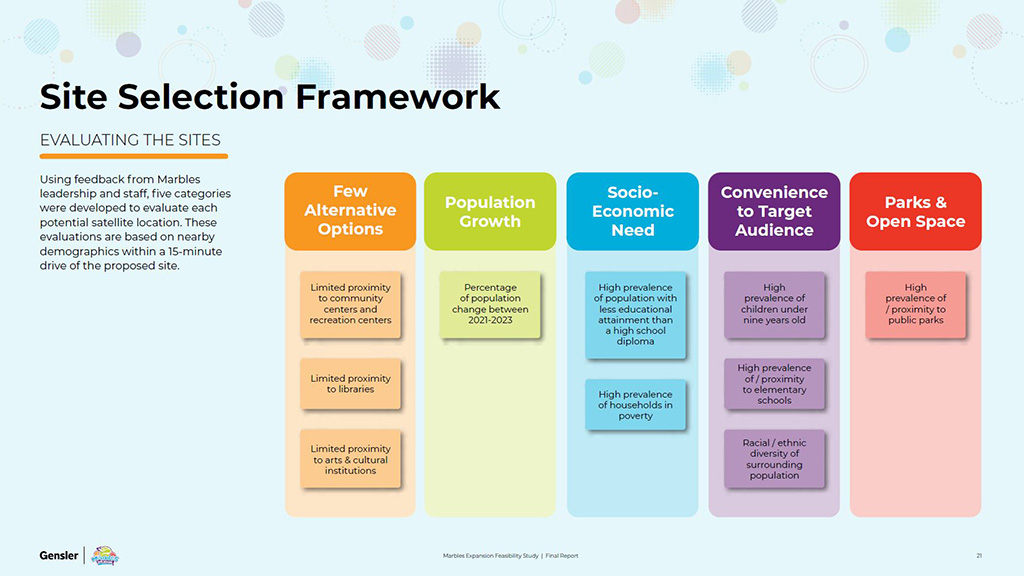
The Urgency Index revealed the right need and location insights that helped Marbles make informed decisions about where and how to expand (including new buildings or mobile centers). This engaging, equity-driven process reflected Marbles’ commitment to bringing its valuable educational and recreational offerings to more families in the region.
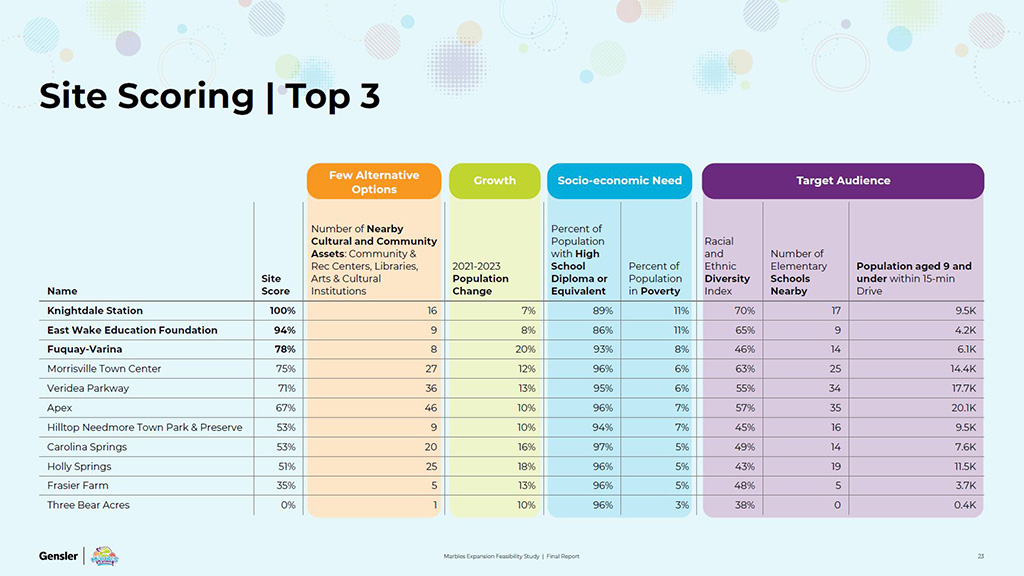
As we continue to navigate the complexities of modern society, we must find innovative approaches to building resilient, inclusive, and thriving communities. Gensler’s Urgency Index exemplifies how data-driven tools, fueled by commitments to equity and accessibility and a heart for equity-based practices, can profoundly impact community planning and the strategic expansion of civic institutions.

For media inquiries, email .
